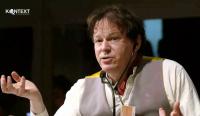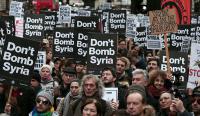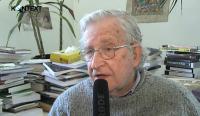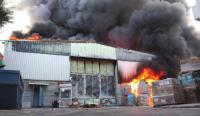Hamas who is ready to talk should be included in negotiations about a two-state-settlement, says Roy. Without Hamas there will be no solution to the conflict. As a daughter of parents who survived the extermination camps in Auschwitz she can’t stay silent on the Israeli occupation policy. “I don't understand how any person and particularly any Jewish person can justify this.” Her parents taught her “that if you do not speak out against injustice, you become complicit in it”. In the last years the liberal Jewish community in the U.S. has grown dramatically while more and more Jews criticize the occupation. Also Germans should speak out and say: “This should end”. “It's not speaking against Israel. Ultimately, it's speaking for Israel.”
Sara Roy, Senior Research Scholar at the Center for Middle Eastern Studies, Harvard University
David Goeßmann: In 2006, Hamas was democratically elected the US, EU and other countries consider Hamas as a terrorist organization due to suicide bombings, rocket firings, and they also claim that Hamas wants to eliminate Israel. So, what is your assessment of Hamas? its development since 2006? And how would you describe the organization in regard to a two-state settlement which is on the table?
Sara Roy: One can only judge this organization, on, on, on what, obviously, on what they do, and on their willingness to engage, and they have made it very clear, over time, arguably since 1988, that they are willing to talk and engage with Israel. So, I can't sit here and tell you that engaging them will produce a positive outcome. But I can sit here and say that if we don't engage them, the outcome will not be a good one. And that one way to moderate… or to if the goal truly is a resolution of the conflict. Hamas is a is a vital actor, whether we like it or not, it is a vital actor, it controls the Gaza Strip. And now in the post Arab Spring era, it arguably has a higher profile, and more legitimacy regionally then does Fatah. Hamas looks at Fatah. The region looks at Fatah sees all the concessions they have made to Israel to the Americans over time, and it has gotten them very little.
In fact, the situation as I've just spent the last few minutes describing has declined, deteriorated dramatically. So, remember, Hamas has that precedent. And they do not want to commit the same mistakes. That doesn't mean they're unwilling to compromise. It doesn't mean that they're unwilling to engage. It simply means that they too have red lines. But one way to, to test them or to test their resolve to test their seriousness is to engage them and when, when Islamists are engaged in that way, and when they are held accountable, not only by their own constituency, but by other constituencies, then they are often forced to moderate. So, for me, I think it is extremely important if people are truly serious about resolving this conflict. Hamas has to be engaged, there can be no resolution to the conflict without Gaza. And there can be no Gaza today without including Hamas. It's as simple as that.
David Goeßmann: When you now look to Germany, declaring unconditional support for the State of Israel, and at the same time, is sending high tech submarines, which are capable of firing nuclear arms to Israel, what is your assessment of German policy toward Israel and the Israel Palestine conflict?
Sara Roy: My feeling is that a true friend of Israel would be prepared to behave in what they consider to be the best interests of Israel. And in my view, the best interest of Israel is to ensure an end to this terrible conflict. And in order to ensure that one has to confront the role that Israel plays in perpetuating that conflict. You know, everything I do, and all the work I've done these, many, many years, is, of course shaped and influenced by my personal history, by the fact that my parents were survivors of the Holocaust. Both of them survived Auschwitz, my father was the first person to escape the death camp at Chelmno, which was the first extermination camp, and he was one of seven survivors, and my mother survived the large ghetto, the Litzmannstadt Ghetto.
I have a very long and, and deep history, with the Holocaust, and the Holocaust was the defining factor in my life. And it is because of that personal history, and the values with which I was brought up the Jewish values with which I was brought up, that I, as a Jew feel I cannot possibly remain silent, when, when other Jews are committing crimes in my name, and trying to justify those criminal acts in my name. Of course, the occupation is extremely damaging to Palestinians. But it is also damaging to Israelis, I don't want to see my cousins and their children grow up and live in a situation of insecurity and violence. I don't want them to grow up learning to hate Palestinians. I don't want my Palestinian friends growing up, and their children growing up learning to hate Jews or Israelis.
The occupation is a terrible thing. It is, as I said, a criminal act against another people. And it is not in Israel's interest. Putting morality aside for a moment. It is not in Israel's long-term interest to sustain this situation, a situation of oppression, dispossession, and criminality. And I don't understand how any person and particularly any Jewish person can justify this. If Germany - I understand the history, obviously better than most, but as a Jew, and as a child of survivors, and I can tell you that my mother felt very strongly about this as well. What is happening is simply wrong, it is wrong, it is immoral, it is criminal, and it cannot be allowed should not be allowed to continue. And uncritical support for Israeli policies vis-a-vis the Palestinians is immoral in my eyes, in my in my view, it is immoral, and it is criminal. And if Germany and any other country truly cares about Israel, they would challenge Israel on these policies on that basis as a friend, as a friend and supporter of Israel. It is important for Germans to speak out and to say, this is wrong, and this should end and not only because it hurts Palestinians because it will hurt you as well.
It is incomprehensible to me. How any human being can look at the situation, any human being has any knowledge or understanding of the situation and not speak out against. I simply cannot understand that. And I can tell your viewers that, in the United States, some of the most outspoken critics of Israeli policy are Jews, that the progressive Jewish community in the United States has grown dramatically in relative terms. When I started my work, there were very few of us in the Jewish community in America, who spoke out critically about this. In the last 25 years or so, the numbers have grown dramatically to the point where we now have national organizations, local organizations speaking out, we don't all agree on everything. But we agree on one basic premise, and that is that the occupation is wrong, it must end it is immoral, and it is damaging for both peoples and that Jews cannot or should not support the oppression of other people, and the denial of their human rights, especially when it is occurring at the hands of other Jews. And in our name.
And this is where I stand this is, you know, where I come from. The fact that my parents survived Auschwitz, and Chelmno and ghettos is entirely consistent with what I do, and why I do it. Of course, there are many Jewish people in this country who wouldn't agree with that, and who would object to that. But for me, being a child of survivors growing up with that personal history, having lost so many members of my family, people I never met, of course, to this horror, this horrific period of time, compels me even more to speak out against injustice wherever I see it. And especially when it's being, as I said, committed in my name, my parents, if they taught me anything in my life, they always constantly reiterated to me the importance of speaking out against injustice, the danger of remaining silent, the danger of standing by on the side and turning your head away and not seeing. It was it was constantly emphasized to me that if you do not speak out against injustice, you become complicit in it. And my own parents lived their lives in that way. And they, you know, whether it was on smaller issues or larger issues, but they always spoke out against what they felt was wrong. And I feel Germans should do that. I feel Italians, Americans, French, any human being with any sense of conscience. It's not speaking against Israel. Ultimately, it's speaking for Israel.





